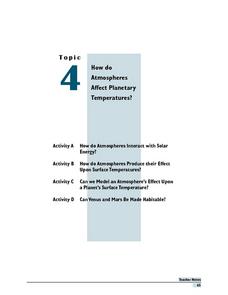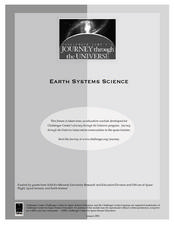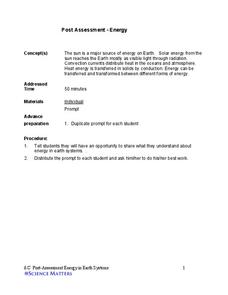Curated OER
Scientist Tracking Network
Students correlate surface radiation with mean surface temperature of several geographic regions. They observe how these parameters change with latitude and construct an understanding of the relationship of solar radiation to seasonal...
Curated OER
Spinning into Space
Students, through hands-on activities, teacher demonstrations, pictures, and informational books, complete a unit on the Earth and its place in the Universe. They make mobiles of the Milky Way and watch demonstrations of lunar and solar...
Curated OER
The Webb Space Telescope: Detecting Dwarf Planets
In this detecting dwarf planets learning exercise, students read about the Webb Space Telescope that will be launched in 2014 to detect dwarf planets using an infrared telescope. Students solve 3 problems and create a graph for each...
Curated OER
Categorizing Celestial Objects
Students work together to develop a classification system for planets. They take a class vote and read an article about an astronomer's classification system. They write an essay on how scientists make decisions for the general public.
Curated OER
A Leap of Space
Students explore how smaller systems exist within larger systems as they build a collage of their place in space! Invite the students to display their posters and talk about their systems and systems of systems.
Curated OER
Don't Marry the Mole!
Third graders examine the power of solar energy. In groups, they create their own pizza box solar oven to discover the power of the sun and how it is a source for heat and light. To end the lesson, they use the internet to examine...
Curated OER
How Do Atmospheres Affet Planetary Temperatures?
Students perform a literature search and use reputable research resources in order to find the surface temperature of different planets in our solar system. They speculate about the observed and unobserved factors. Then brainstorming is...
Curated OER
The Earth-Moon System
In this Earth and moon worksheet, students will review the different phases of the moon, how eclipses are created, and how the moon influences tidal patterns. This worksheet has 13 fill in the blank, 8 true or false, and 2 short answer...
Curated OER
Earth Systems Science
Students perform experiments designed to grow plants and bacteria in a controlled environment. In this ecosystems lesson students investigate varying conditions for growing plants and bacteria.
Space Awareness
Climate Zones
The climate at the equator is hotter than the climate at the poles, but why? The lesson plan goes in depth, explaining how the angles of illumination relate to the heating rate at different latitudes and seasons. Scholars use a strong...
Teach Engineering
Concentrating on the Sun with PVs
Concentrate to determine the best reflector design. Pairs use the engineering design process to build a reflector to increase the current output of a photovotaic panel. Teams arrive at a final design and present it to the class along...
PHET
CME Plotting
Young scientists build on their previous knowledge and apply it to coronal mass ejections. By plotting the path of two different coronal mass ejections, they develop an understanding of why most don't collide with Earth.
Space Awareness
Making A Sundial
Can people really measure time just by using the sun? Scholars venture outside on a nice, sunny day to build sundials and learn how people measured time 600 years ago. The class builds two different sundials while gaining practice with...
Science Matters
Post-Assessment Energy
After nine lessons and activities about energy, here is the final assessment. The 20-questions include multiple choice, multiple choice with justification, short answer, answer analysis, and labeling diagrams to challenge learners.
Space Awareness
Oceans as a Heat Reservoir
Oceans absorb half of the carbon dioxide and 80 percent of the greenhouse gases released into the atmosphere. Scholars learn how and why the oceans store heat more effectively than land and how they help mitigate global warming. Pupils...
S2tem Centers SC
Seasons
Winter, spring, summer, and fall—take the learning of the seasons beyond the elementary level to the middle school classroom. Curious learners begin by watching videos about the seasons and the rotation of planet Earth. Then,...
Other popular searches
- Solar System Crossword
- Solar System Worksheets
- Solar System Word Search
- Solar System Art
- The Solar System
- Solar System Lesson Plans
- Solar System Math
- School Projects Solar System
- Components of the Solar System
- Solar System Model
- Earth Movement Solar System
- Solar System Constellations

















